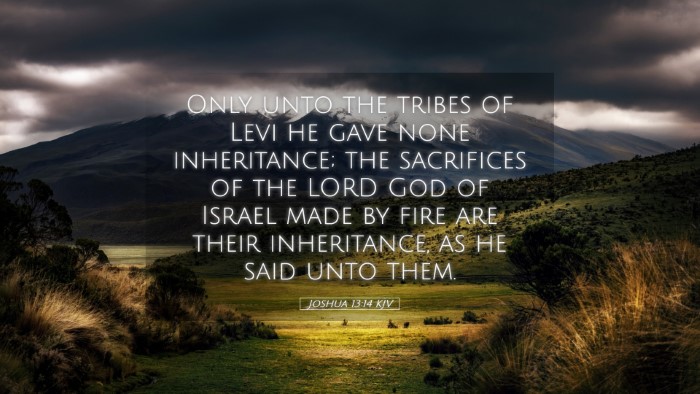Bible Commentary on Joshua 13:14
Text of Joshua 13:14 (NKJV): "Nevertheless, the children of Israel did not drive out the Geshurites or the Maacathites; but the Geshurites and the Maacathites dwell among the Israelites until this day."
Introduction
Joshua 13:14 presents a pivotal moment in the history of Israel's conquest of Canaan. This commentary synthesizes insights from esteemed public domain sources, exploring themes such as divine inheritance, disobedience, and the consequences of failing to completely follow God's commands.
Historical Context
The backdrop of this verse lies in the Distribution of the Promised Land after the conquests led by Joshua. The Israelites had been commanded to eliminate the inhabitants of Canaan (Joshua 1:2-6), yet in this instance, we see a departure from that directive. The failure to drive out the Geshurites and Maacathites signifies more than mere military oversight; it epitomizes a broader spiritual malaise that can arise from neglecting God's explicit instructions.
Commentary Insights
Divine Inheritance and Its Implications
Matthew Henry notes that the inheritance allocated to the tribes of Israel was not merely a piece of land but was saturated with God's promises and intentions. The presence of residual nations within the territory, particularly the Geshurites and Maacathites, signals a compromised inheritance. Henry emphasizes the theological implications of this compromise; the unexpelled inhabitants served as a continual reminder of Israel’s disobedience and the incomplete fulfillment of God’s covenant promises.
Disobedience and Its Consequences
Albert Barnes elucidates that the failure to eradicate these nations is emblematic of Israel’s gradual deviation from God’s commands. This act of disobedience may seem trivial at first, yet it foreshadows the future troubles that Israel would face. The coexistence of these tribes with the Israelites leads to corrupting influences that would later infiltrate the nation (Judges 1:29-33). Barnes asserts that such compromises can lead to greater spiritual decline, encouraging a pattern of sin that extends throughout the history of Israel.
Cultural and Spiritual Significance
Adam Clarke describes the Geshurites and Maacathites as not just historical figures but as representations of the challenges believers face concerning temptation and moral integrity. Their presence among the Israelites illustrates the Christian struggle against sin and the necessity of vigilance in maintaining purity of faith. Clarke emphasizes that the integration of opposing cultures into the life of Israel reflects a lack of commitment to God’s commandments, stressing that Christians must steer clear of allowing worldly influences to inhibit their spiritual walk.
Theological Reflections
Implications for Modern Believers
As modern believers reflect upon Joshua 13:14, several key theological insights arise:
- Call to Faithfulness: This passage is a reminder of the importance of faithfulness to God’s word. Just as Israel was instructed to drive out the inhabitants of Canaan, Christians today are called to eliminate sin from their lives.
- Consequences of Compromise: The presence of the Geshurites and Maacathites serves as a warning against the dangers of spiritual compromise. Bringing any foreign element into one's life can lead to disobedience and ultimately affect one's relationship with God.
- The Reality of Unfulfilled Promises: The unfulfilled aspect of the inheritance serves as a metaphor for the unfulfilled promises in the lives of believers. It calls for an understanding that spiritual inheritance often requires active faith and obedience.
The Role of Remnant
Additonally, the Geshurites and Maacathites symbolize a remnant of unbelief that persists within the bounds of the faithful community. This remnant challenges believers to remain vigilant against the encroaching influence of sin, continuously striving to uphold the sanctity of their covenant relationship with God.
Conclusion
In conclusion, Joshua 13:14 serves as a profound commentary on the themes of divine inheritance, obedience, and the spiritual ramifications of compromise. The insights from Matthew Henry, Albert Barnes, and Adam Clarke together enrich our understanding of this passage, providing modern readers with critical reflections on the necessity of faithfulness, the dangers of complacency, and the urgent call to pursue holiness amidst a world of distractions. As believers navigate the complexities of their spiritual journeys, Joshua 13:14 stands as an enduring reminder of the high calling of God upon their lives.


